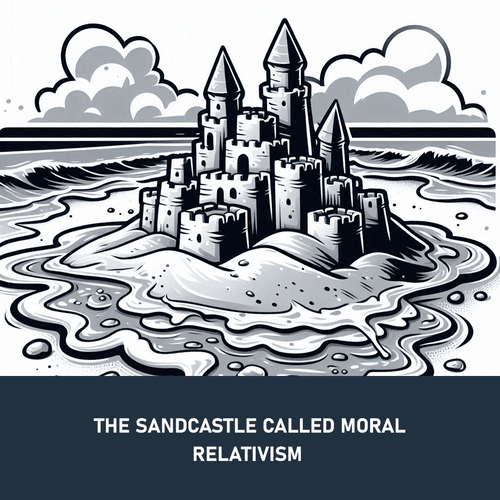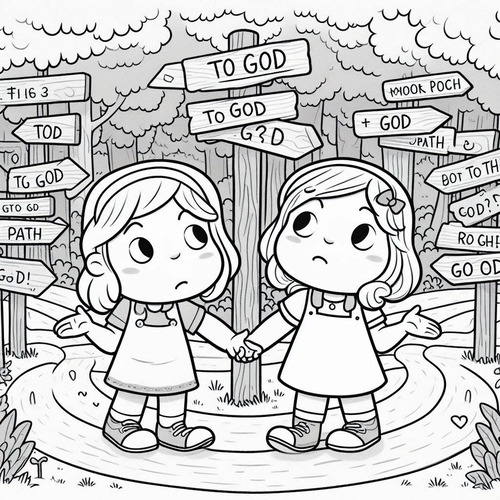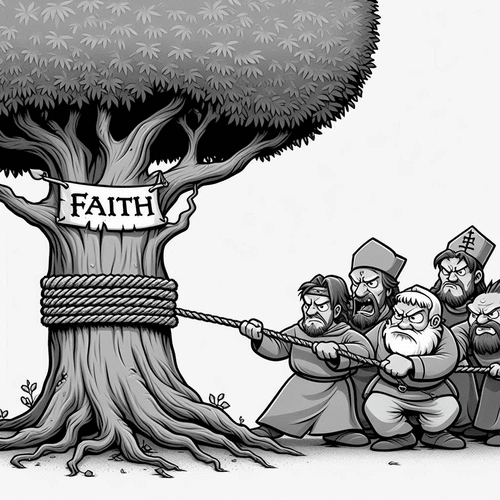The Sandcastle of Moral Relativism: A Christian Perspective
Moral Relativism: A Road to Chaos or A Path to Tolerance?
Moral relativism is a philosophical viewpoint that has gained significant traction in modern society. At its core, it posits moral truths are not absolute—but relative to an individual or a culture’s beliefs and values. Proponents argue that since different societies have diverse moral frameworks, there can be no universal moral standard that applies to all people, in all places, at all times.
The allure of moral relativism lies in its promise of tolerance and respect for cultural diversity. It appears to offer a way to navigate the complexities of a pluralistic world, where imposing one’s moral values on others is seen as a form of oppression or cultural imperialism.
However, from a Christian perspective, the sandcastle of moral relativism presents profound philosophical and practical challenges that strike at the very heart of the faith’s teachings on morality, human dignity, and our shared humanity. Here’s why:
‘Intolerant’ to None, Disrespectful to All: Moral relativism may masquerade as a tolerant and inclusive worldview. However, given its denial of objective moral truth, it is antagonistic to the fundamental beliefs of all major faiths. All faiths have moral absolutes their adherents believe are divinely ordained and universally binding. The notion that moral truths are mere personal preferences or cultural constructs directly contradicts the scriptures and moral codes that form the bedrock of these faiths. By rejecting the existence of objective moral standards, moral relativism dismisses the moral authority of religious teachings, reducing them to mere opinions subject to individual interpretation. This stance is thus inherently disrespectful to all faiths. Ironically, in its pursuit of tolerance, moral relativism ends up being intolerant towards the deeply held convictions of religious communities, undermining the very diversity it claims to celebrate.
The Importance of Objective Moral Truth: Christians believe moral truths are objective, transcendent, and rooted in the unchanging character of God. The Ten Commandments, Jesus’ moral teachings, and the ethical principles outlined in the New Testament are not mere social constructs but divine revelations that reflect the inherent worth and dignity of every human being.
Without an objective moral standard, the Christian worldview loses its foundation, and morality becomes an arbitrary, ever-shifting set of preferences. Moral relativism opens the door to a world where injustice, such as genocide, oppression, and exploitation can be justified as culturally acceptable norms, undermining the universal human rights and dignity that Christianity upholds.
The Problem of Moral Progress: Moral relativism also struggles to account for the concept of moral progress. Throughout history, societies have recognized and rejected immoral practices such as slavery, oppression of women, and child labour, not because cultural norms shifted, but because these practices violated an objective moral standard that transcended any particular culture.
If morality is entirely relative, how can we condemn past atrocities or strive for a more just and ethical world? The Christian perspective acknowledges that while our understanding of moral truths may deepen over time, the moral truths themselves are anchored in the unchanging character of God, providing a stable foundation for moral progress.
The Paradox of Tolerance: Interestingly, moral relativism itself faces a paradox: if all moral beliefs are equally valid, how can it condemn those who reject tolerance? By denying the existence of objective moral truths, moral relativism inadvertently undermines its own call for tolerance, as intolerance itself becomes a morally defensible position.
The Christian Response: From a Christian perspective, the solution to navigating moral diversity lies not in moral relativism but in a principled commitment to objective moral truths rooted in the character of God, coupled with humility, empathy, and a willingness to engage in respectful dialogue.
Rather than imposing moral absolutes through coercion or force, the Christian approach seeks to persuade through reason, love, and a genuine concern for the flourishing of all people. It recognizes that while moral truths are objective, our understanding of them is shaped by culture, tradition, and personal experience.
By upholding the inherent dignity of all people and engaging in respectful discourse, Christians can navigate moral differences while remaining anchored in the immutable moral truths revealed by God. It is a delicate balance, but one that ultimately recognizes our shared humanity and the universal longing for justice, compassion, and ethical coherence.
In a world plagued by moral confusion and ethical relativism, the Christian worldview offers a beacon of hope—a way to affirm universal human dignity while embracing the richness of cultural diversity. It is a call to transcend the shifting sands of moral relativism and anchor our lives in the unshakable foundation of God’s eternal moral character.
The Paradox of Tolerance: A Self-Defeating Philosophy
The sandcastle of moral relativism, the idea that moral truths are subjective and culturally determined, faces a glaring paradox that exposes its own inherent incoherence. If relativism claims all moral beliefs are equally valid, on what basis can it condemn those who reject tolerance itself? By denying the existence of objective moral truths that transcend individual preferences, moral relativism inadvertently undermines its own rallying cry for tolerance.
After all, if morality is purely a matter of personal opinion or cultural norms, intolerance becomes just as defensible as tolerance. An intolerant person or society could simply assert his moral code sanctions discrimination, oppression, or even violence against others. Without an objective moral foundation, relativism has no compelling justification to declare such intolerant views as ethically inferior or invalid.
This paradox reveals the self-defeating nature of moral relativism. In its quest to be maximally inclusive of all perspectives, it ends up embracing a framework in which the most reprehensible ethical stances cannot be authoritatively condemned. Tolerance itself becomes an arbitrary preference rather than a universal moral imperative.
Ultimately, the paradox exposes moral relativism’s inability to ground human rights, human dignity, and core ethical values in any objective reality. It reduces morality to a matter of mere opinion, leaving us adrift in a sea of competing subjective preferences with no objective means of adjudication. As such, moral relativism fails to provide a coherent and defensible ethical system capable of navigating the complexities of human society and experience.
Related Reads
Editor’s Pick

Why Do Some Respond to God’s Call While Others Don’t?
THE REFORMED VIEW ON OUTWARD AND INWARD CALLS EXPLAINED Picture this: Two neighbours attend the same church service. They hear [...]

Does Ocean Salt Content Prove a Young Earth?
A COMPELLING LOOK AT MARINE CHEMISTRY AND EARTH’S TIMELINE The Salt Question That Challenges Deep Time: If Earth’s oceans have [...]
Noah’s Flood: Where Did All the Water Come From? And Go?
The question hits every Bible-believing Christian at some point: “If Noah’s flood covered the whole earth, where did all that [...]

No Marriage in Heaven? What Does Mark 12:25 Mean?
“Will I see my spouse in heaven? Will we still be married?” These questions pierce the heart of every Christian [...]
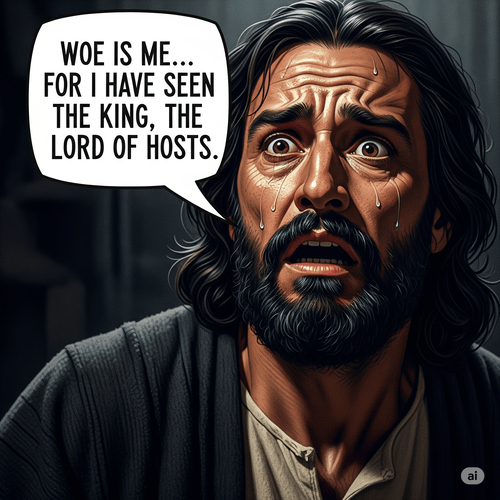
The Terror of Meeting God: What Isaiah 6 Reveals About Divine Holiness
WHEN ‘WOE IS ME’ IS THE ONLY PROPER RESPONSE TO A GLIMPSE OF GOD Picture this: You’re a prophet of [...]

Is the Holy Spirit Present in Unbelievers? The Biblical Answer
Can someone who doesn’t believe in Jesus Christ have the Holy Spirit living inside them? This question strikes at the [...]

The Gap Theory Exposed: Why Embrace a Young Earth?
The Gap Theory proposes there’s a vast time gap—millions or billions of years—between Genesis 1:1 (“In the beginning God created [...]

Rethinking Sickle Cell Anaemia: A Case for Intelligent Design
Sickle cell anaemia presents what many consider evolution’s strongest card—a genetic condition that causes suffering yet provides protection against malaria. [...]
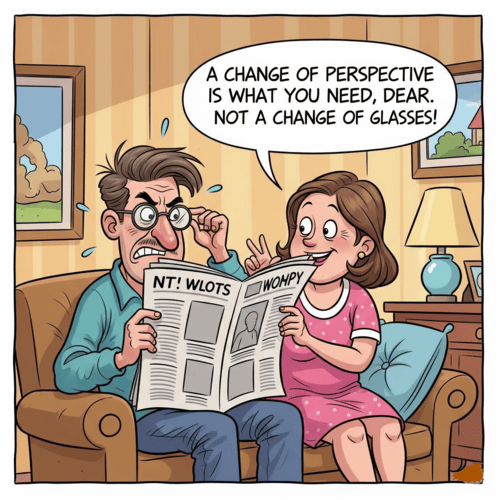
‘Bad’ Design: Flaw in Nature Or Flaw in Our Perspective?
When the Eiffel Tower was first proposed, critics called it a monstrous eyesore that would ruin Paris forever. Today, it’s [...]

The Problem of Divine Absence: How Do Believers Cope?
WHEN GOD SEEMS FAR: THE GREAT DISCONNECT Ever wondered why God seemed so close to Joseph in his Egyptian prison, [...]

